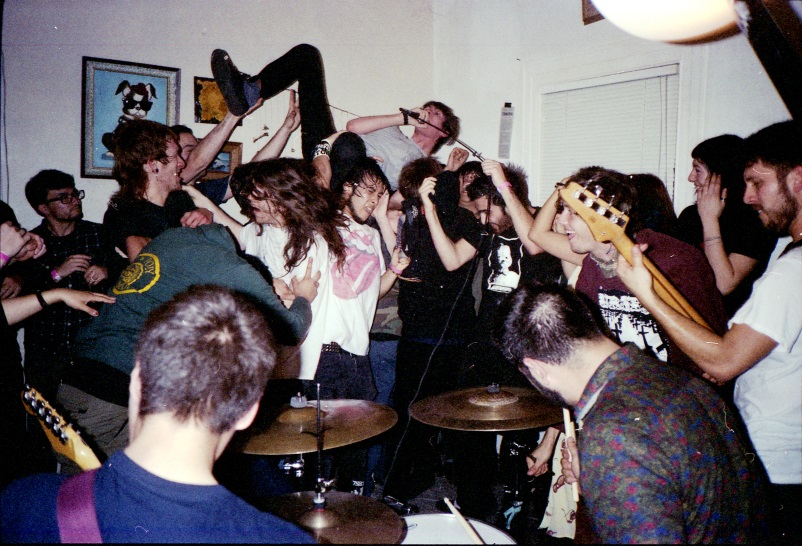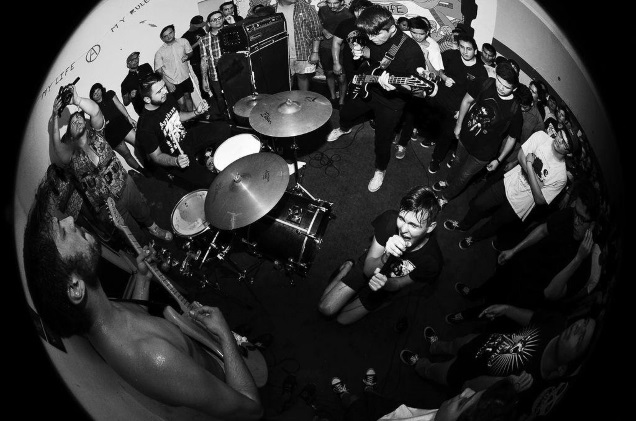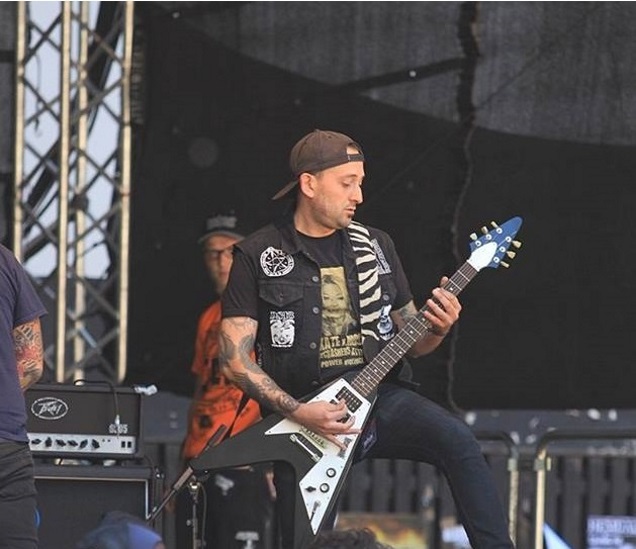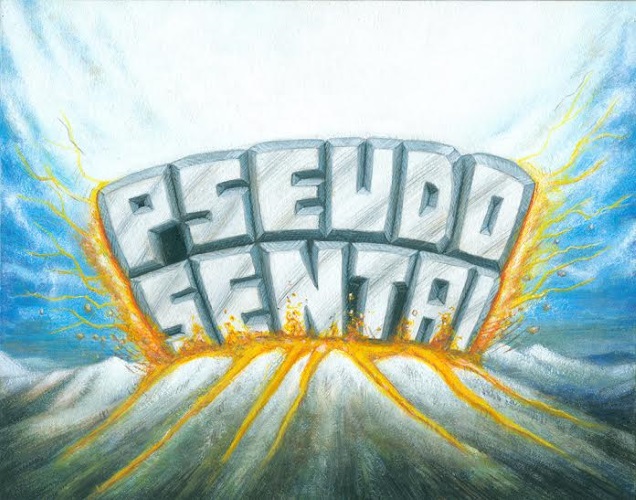“Recomposition” by Californian post hardcore / screamo band LA BELLA shows such promising range and potential that I can’t literally understand how on Earth did I’ve been missing it for 3 bloody years! The band’s upcoming follow up to these undisciplined, addictive songs is just one of a couple reasons why I love what they do. Meeting dedicated and inspiring artists, activists, and social change advocates who work relentlessly to both inspire and create new opportunities for local youth has always been one of the main reasons for running my webzine and conducting hundreds of interviews. Here’s yet another motivating discussion with Cameron of LA BELLA and Bridgetown DIY collective, who manages to transfer his activity in an intelligent way to the listener and thousands of people who attended their youthb community centre.
Photo by Daniel Torres.
Hey Cam! Thanks so much for reaching out! I’m so glad you did it, otherwise I could have not even known about LA BELLA! And it would be a great miss for IDIOTEQ readers! ‘Recomposition’ is a total blast and I simply can’t wait to hear more from you guys. How are you? How did you come across my webzine?
Thanks so much for the kind words. I just got off of work, so I’m doing pretty well! I don’t remember exactly when I came across IDIOTEQ for the first time – it was a while ago – but I’ve made a point of coming back to it when I’m interested in reading about d.i.y. bands, both from the U.S. and internationally. It’s hard to find music journalism that consistently approaches what it’s covering with a principled, d.i.y. ethic – that’s one of the central reasons why I’ve kept IDIOTEQ in the bookmarks on my browser.
Cool, thanks a lot!
Photo by Daniel Torres.
What part of L.A. are you from? Can you tell us more about your neighbourhood and local music scene?
Although we usually say that we’re from Los Angeles, in reality we’re all from towns that are inside L.A. County, but not necessarily in the city limits. This is the bizarre situation of living in L.A.; nearly every city has its own unique community of bands and shows, who at the same time circulate around our larger community which stretches across most of Southern California. I can’t think of single band in our community that has all of its members living in the same city or town. This is both really great and provides a broad make up of voices and ideas, but also really frustrating in that it sometimes leads to difficulties reconciling the differences between each community.
Almost all of us, excluding Daniel, are from towns that are about 25 minutes (without traffic) east of downtown Los Angeles. Prior to LA BELLA starting, all of us played music, booked shows, wrote zines and hung out around San Gabriel Valley. Andy and John were in a band called BADMOUTH that played shows consistently from 2007 to 2011, I wrote a zine called Coup d’état and booked shows. Most of the shows during that time happened in houses or garages – but as the community grew, it attracted more attention from cops and almost every show that was booked ended up being shut down. Eventually, we resolved to establish a more permanent space that would allow us to not only book shows, but also contribute to our community through political organizing, visual art and other things. So, in 2012 those of us in LA BELLA, along with a number of other people from our community helped to establish a small infoshop space called Bridgetown D.I.Y. Most of us are still involved with organizing in the space, but it has grown to foster a community of its own.
Oh yeah, the Bridgetown! I really love the idea of hosting so many meetings, workshops and projects that don’t have to be strict concerts. My first association with such spaces are European squats, which have such a great importance in punk culture. Was this concept an inspiration to create Bridgetown? Are there many cultural youth centers in America?
Yeah! La Puente, the city that Bridgetown is located in, translates to “the bridge” in English (although we actually chose the name before we knew we were going to be renting a space in La Puente). When we started the collective to organize Bridgetown in 2011 we definitely had spaces like the squats in Europe and older American D.I.Y. spaces; ABC NO RIO in New York and 924 Gilman in Berkeley, in mind.
Although we don’t have many squats in the U.S., save for maybe a few in Oakland like RCA/Hotmess (RIP), we definitely have youth spaces, infoshops and an assortment of other radical political and arts spaces that cater to kids who want to book shows or start making art or even to get active politically. Here in southern California we are lucky enough to have a number of collectives who have been committed to creating and maintaining these spaces. Blood Orange infoshop is to Bridgetown’s east in a city called Riverside and the Ché Café, one of the oldest and most prominent radical D.I.Y. spaces in the U.S., is located to Bridgetown’s south in San Diego on the University of California San Diego campus.
Speaking of the Ché, I should mention that the existence of these spaces doesn’t come without struggle. Over the last year, University of California administrators have been trying to evict the Ché from its space. Bridgetown collective members and members of LA BELLA, including myself, have been actively involved in organizing resistance to the eviction. We’ve been chronicling the events surrounding this resistance with a documentary that is set to be released toward the end of the summer.
We had a very similar experience back in 2012 when one of the biggest and most famous squats in Poland was evicted. Do you believe such places can be safe and left to flourish in their won locations, or do you think their poor end is inevitable?
I think that spaces, communities and communes who attempt to establish themselves outside of the logic of capital are going to be assailed so long as they exist as zones of confrontation. These spaces, like Elba and other European squats are attacked because they successfully circumvent the market for housing by re-purposing old buildings for those who need shelter at no cost. Similarly, the Ché has resisted the rising tide of neo-liberal reforms like privatization and austerity that have been adopted by the public university system here in California. As programs are cut, campus culture is erased and tuition continues to go up at the UC, the Ché has remained ardent in its existence as an affordable, collectively run venue and social center.
I think that these spaces flourish in periods of intense struggle, they come into their own in these times. If they were not flashpoints of confrontation between ourselves on one side and the state and capitalism on the other, I don’t think that they would be valuable. I’ve witnessed some of the most intense and spontaneous acts of solidarity between members of collectives whose existence was directly threatened. Spaces will come and go, but that makes our struggle to create and hold on to them that much more important.
Photo by Daniel Torres.
Ok, Cameron, so let’s learn a bit more about your other project – the band! You’re preparing to release an LP in the coming months. This will be our first full length, so you must be thrilled! How do you feel about this new material?
Definitely, all of us are really pumped on the way the record has come together. It’s been three years since we released Recomposition and just as much time since we’ve released any other material. The writing process has changed for us pretty drastically, especially with Andy having moved to Seattle, Washington. But despite changes and difficulties, we’ve put together something that we’re proud of. It shouldn’t go unmentioned that Jack at Atomic Garden played a huge part in helping make the record a reality and we’re extremely grateful for the attention to detail that he gives to the projects that he records.
Photo by Daniel Torres.
What can we expect from the production? Who are you working with this time and how has the sound evolved?
As with our last material, we decided to head up to the Bay Area to record with Jack Shirley at the Atomic Garden. Unlike last time around though, we are having Jack produce the entire record, front to back. What he brings to the table in terms of production is a wealth of knowledge that’s hard to find elsewhere; an innumerable number of musicians who we respect and admire have worked with Jack and we feel privileged to be able to do the same.
Sonically, I think that we’ve grown in ways that we didn’t necessarily expect. Over the span of time that this band has existed, almost all of us have explored other musical projects in conjunction with the band we’re in together. John, Andy and Daniel all play(ed) in bands that share almost no similarities, musically or otherwise, to La Bella. I think that writing for those projects has greatly influenced the writing on this record. The thing that keeps coming across my mind as I listen to the initial mixes of the recordings is that this record, save for a few moments, is a lot faster than what we’ve put out before.
Photo by Daniel Torres.
The new school of hardcore bands you might class as post hardcore / screamo are very generic, kind of busy in the line thinking, but “Recomposition” proves to be one of the most imaginative post hardcore / screamo records in the recent years! What was your approach to songwriting back then and what are your goals while composing now?
Thanks for that huge compliment, it means a lot to us. Recomposition was the second set of songs that we had set out to write. I believe our demo had been out for around 6 months before we started on writing that record, so we were still in the beginning of finding solid footing for our process and sound. I don’t think we necessarily had in mind that we wanted to press a 7″ with the songs that we wrote after the demo, but that sort of materialized when we felt like we had written something that could stand on its own. In order to write the songs, we usually would end up at John’s house (which doubled as a practice space for several bands) and try to parse out an entire song from a riff or vague idea that somebody brought with them. On some occasions, songs were written spontaneously. Out of the 7 that ended up on Recomposition, there were probably 2 or 3 finished or nearly-finished ideas for songs that ended up being trashed somewhere along the way. We (constructively) critique each other pretty heavily throughout the process of writing and sometimes even after finishing a whole song, we make the collective decision to scrap it.
We had a much more solid conception of what we were trying to put together for the current record. We knew that we wanted to write something that was a bit longer than our last release and that could hopefully demonstrate and catalog what we had learned since the the band had been conceived. Writing for the current record started about 9 months after we released Recomposition – and it was spotty at first. During this period of time, Andy and John had relocated to Portland, Oregon, making it extremely difficult to write collectively. Although we played a number of shows during that time, I don’t think we spent more than a combined 10 or 11 hours writing new material as a band. Luckily, Andy had been writing on his own and when both him and John decided to come back to Los Angeles, we were able to spend a great deal of time working through what Andy had amassed.
It’s strange to think, but some of the songs that we’re just about to release are nearly 2 years old. I think this can be attributed to the fact that we were much more ruthless in our tearing down and re-working or trashing of songs than we had been in the past. We also didn’t do a great job of balancing writing with our desire to play shows. In 2013 I think all of us had a deep desire to go on a full U.S. tour, but at the same time we wanted to take new material with us on the road. We made sort of a rash decision to record the three songs that we had written and put out a tape version of them that we called “Essays”. After all was said and done though, we really didn’t like the way the songs sounded on those recordings, which was our own fault for having rushed them into production. We didn’t sell the tapes anywhere but during the U.S. tour – I think we’re all sort of embarrassed that those songs are even out there, but I’ve reconciled it by just thinking of them as demo versions of songs on the new record, with alternate titles. I think we maybe made 40 copies of those tapes. I don’t even own one myself, but you might be able to find a copy floating out there somewhere.
After getting back from the tour, we made the decision to spend more time writing, which we did. We spent much of 2014 writing and playing shows on and off. Sometimes we felt really strong about what we were creating, other times we scrapped entire weeks worth of work. Eventually, Andy made the decision to move back to the Pacific North West, to Seattle specifically. This once again complicated things for our writing process, but I believe it also gave Andy the space to write some of the best songs on the record. While Andy was away, John, Daniel and I wrote a couple of songs together, one of which we kept and another that was thrown out. About a month before we were set to go into the studio, Andy came down to L.A. so that we could finish the songs that he had written on his own and so that we could polish the entire project off.
I think that the erratic writing schedule for this record can sort of be heard in its content, in a positive way.
Photo by Jennai Bundock.
Lyrics-wise, is there a core concept to your recordings? Was that in your mind as you were writing? Have you been exploring a new approach or way of thinking while preparing this new record?
Other than the desire to address political, social and economic issues that we feel are pertinent, I can’t speak to an overall conceptual continuity between records that we’ve put out. I do think that each record tries to offer a fluidity or thread that binds it together as a complete piece which is capable of standing on its own – hopefully the same can even be said for each song that we write.
For example, Recomposition came with a piece of liner notes that spoke to why and how the record ended up with the name that it did – we felt the need to make an attempt at contextualizing the anger or desperation that we (meaning all of us involved in making emotionally charged music) express through the songs that we write.
I think the themes present in our upcoming release attempt to do the same, while also extrapolating from our anger and desperation a means for redress – be it through mending broken interpersonal relationships stemming from alienation or through insurrection/social revolution. It wasn’t often that personal issues were addressed in the lyrics that the band has written in the past. However, in writing for the upcoming release I semi-consciously began to make an attempt at incorporating the personal into the political.
In speaking about anger I think it should also be mentioned that it can become tiresome without the counter-introduction of as much joy or even fun in the music. If we are making a serious attempt at creating art which will challenge conceptions of ourselves and the world we find ourselves in, while at the same time trying motivate action to fight the shit that prevents us from realizing a better world – then we shouldn’t just relegate ourselves to a state constant anger and the cynicism that eventually accompanies it. Playing music is fun and liberating, as can be taking the initiative to tear down and rebuild the world for ourselves – I think a lot of hardcore punk bands should be reminded of that.
That being said, I don’t even think that an artistic project like a band should simply be reduced to its political content. If its members are making a cogent attempt at self expression, there is much more to unpack and consider than the even the main political thrust of its content.
I think that any time you approach a new project it’s important to examine and re-evaluate what you liked and didn’t like about the process you went through in previous projects. I definitely spent more time reading and taking notes on books that stood out to me as compelling than I did in preparing for the last record. I’m sure there will be a long list of “recommended books” in the liner notes for this record.
Photo by Daniel Torres.
Do you want to tease it and post a couple of recommendation to our readers before we sign off?
Definitely. I’m always happy to recommend reading for people. These are some of the things that I’ve read and re-read while the record was being put together!
Living My Life by Emma Goldman (her autobiography), which I think should be required reading for any radical, especially those of us who come out of the anarchist tradition in the United States.
The Coming Insurrection by The Invisible Committee, a small book that was published in 2008. A book that has informed much of the praxis of some radical milieus across both Europe and the U.S. over the last 7 years. Several authors of the book were jailed by French authorities on charges of ‘conspiracy’.
To Our Friends by The Invisible Committee, the follow up to The Coming Insurrection published just at the beginning of this year. The Invisible Committee looks back at and contextualizes the last 7 years of world events and the shifting political, social, technological and economic geography of our society.
Decolonizing Anarchism by Maia Rammath, an important text that examines South Asian struggles against hard power colonialism and the soft power of neocolonial globalization. A book that does a great job at facilitating a synthesis between theories of decolonization and anti-state/anti-capitalist theory, without falling into the liberal trappings of ‘identity’ politics.
Outlaws of America: The Weather Underground and the Politics of Solidarity by Dan Berger, a really great read for those interested in anti-imperialist and anti-racist radical organizing that was going on in the U.S. during the 1960’s and 70’s. The book specifically examines The Weather Underground and its sordid, sometimes clumsy practice and theory.
Eclipse and Re-Emergence of the Communist Movement by Gilles Dauvé. Originally Written in the aftermath of the failed student and worker revolt that took place in France 1968, this book has been re-published with addendums and updates for the third time. I actually hadn’t heard about it until I was invited to attend a discussion/release party for it. Very interesting material that has informed a lot of contemporary proponents of communization theory.
Cloudsplitter by Russel Banks. A novel that recounts a dramatized version of the actual historical events surrounding John Brown – an abolitionist who believed that direct action and violent confrontation were the only ways to end slavery in the United States.
Wow, there’s a whole lot of interesting stuff to go through. Thanks so much! Thanks for the chat Cam and a nice compilation of insightful thoughts. Would you like to add anything else before we say goodbye?
No problem, thanks for asking me to list some of my favorites. I just want to say thanks for taking the time to speak with me! We’d love to be able to make it to Europe in the near future, so if we do we’ll say hi. Thanks also for putting the amount of time and effort that you do into maintaining this site, it’s a really great resource. We’ll definitely speak again when the record is released.
IDIOTEQ vs LA BELLA round II. Sounds like a deal. Till next time!
LA BELLA Bandcamp
LA BELLA Facebook
LA BELLA official website
LA BELLA BigCartel
[email protected]
Bridgetown DIY Facebook
Bridgetown DIY official website
[email protected]
Bridgetown DIY official website
[email protected]

















